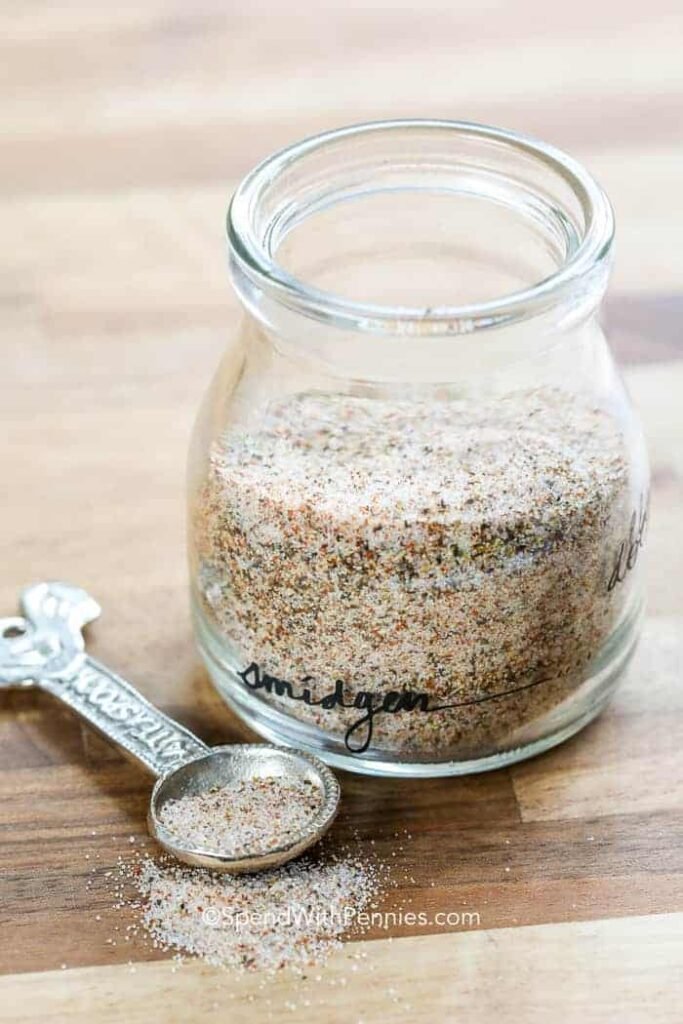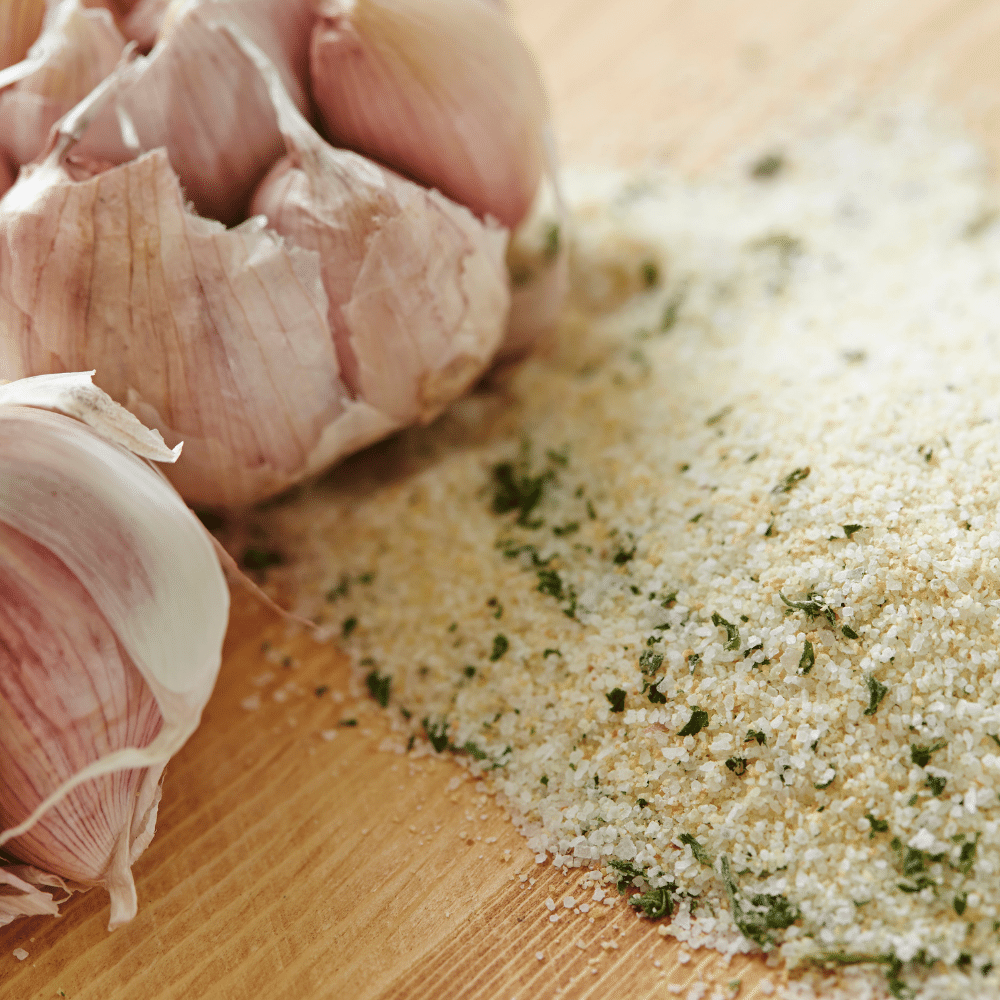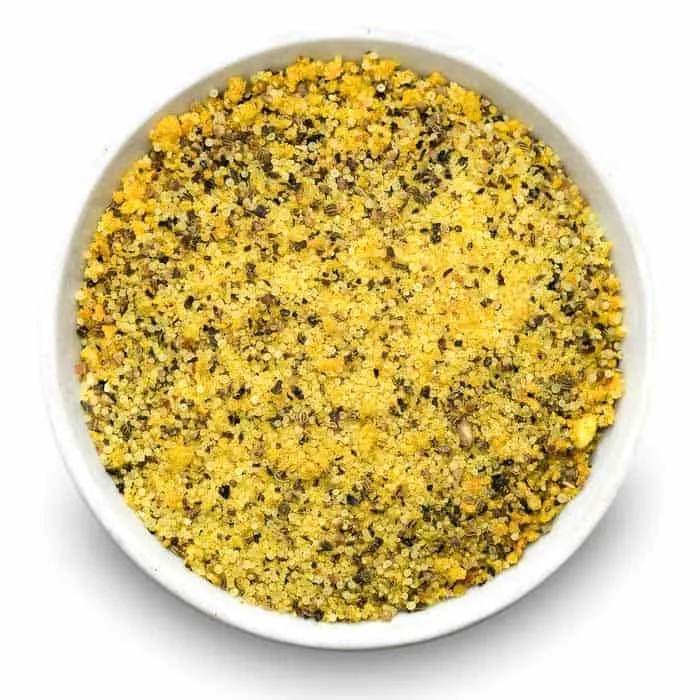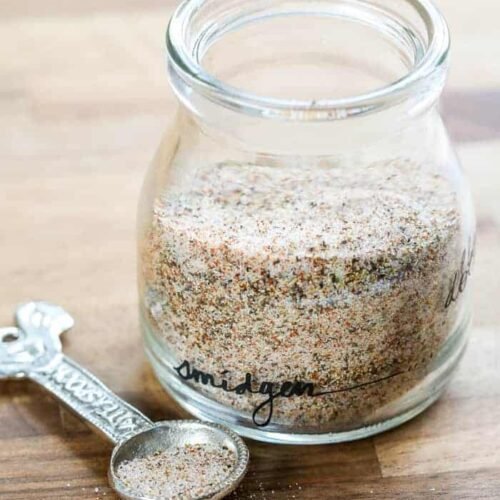Are you looking for a tasty way to give your meals an extra kick?
Seasoned salt is one of the best ways to do just that.
This combination of herbs and spices can add flavor, color, and texture to any dish.
However, if you don’t have seasoned salt on hand or don’t want to use it due to its high sodium content, there are several alternatives that will still provide great flavor.
In this article, I’ll share five of the best substitutes for seasoned salt so you can enjoy delicious dishes without sacrificing taste.
What is Seasoned Salt?

Seasoned salt is a blend of table salt, herbs, spices, and other flavorings.
It can be used as an all-purpose seasoning for meats, vegetables, salads and more.
The ingredients in seasoned salt vary depending on the brand or recipe but typically include some combination of table salt (sodium chloride), onion powder, garlic powder, paprika, celery seed and sugar.
Some brands may also contain MSG or monosodium glutamate to enhance flavor.
Seasoned salts are often used as a substitute for plain table salt when cooking because they add extra flavor without having to use multiple seasonings.
They can also be used as a finishing touch on dishes like grilled meats or roasted vegetables to give them an extra boost of flavor before serving.
Seasoned salts are available in both coarse and fine grinds so you can choose which one works best for your dish.
The 5 Best Substitutes For Seasoned Salt
Seasoned salt can be an essential ingredient in many dishes, but it can sometimes be hard to find.
If you’re looking for a substitute, here are five options that will still give your meals the same flavor:
1 – Garlic Salt

Garlic salt is a great alternative to traditional seasoned salt, offering a unique flavor profile that can elevate any dish.
It’s made from a combination of dried, ground garlic and table salt with an anti-caking agent.
The ratio of garlic to salt varies depending on the brand but typically it’s 3 parts salt to 1 part garlic powder by volume or 6 parts salt to 1 part garlic powder by weight.
This blend gives the seasoning a robust garlicky flavor without being too overpowering.
Garlic salt can be used in place of regular table salt for added flavor in soups, stews, sauces, marinades, and more.
It also works well as a rub for meats like beef and pork before grilling or roasting them.
For those looking for an easy way to add extra depth of flavor to their dishes, garlic salt is definitely worth trying out!
2 – Onion Powder

Onion powder is a great alternative to seasoned salt, as it can provide the same savory flavor with a hint of sweetness.
This pantry staple is made from dehydrated and ground onions, which are then finely milled into a powder.
It has an intense onion flavor that works well in many dishes, such as soups, stews, sauces and marinades.
Onion powder also adds depth to spice mixes like beau monde seasoning or Cajun seasoning.
It can even be used on its own for added flavor in salads or roasted vegetables.
The type of onion used will affect the flavor of the powder – white onions tend to have a milder taste while yellow and red onions are more pungent.
Toasted onion powder has an even deeper flavor profile than regular onion powder.
For those looking for an easy way to add extra umami to their cooking without using seasoned salt, try adding some onion powder instead!
3 – Celery Salt

Celery salt is a unique seasoning blend that adds an extra layer of flavor to dishes.
It’s made from a combination of table salt and ground celery seeds or lovage, which gives it a distinctively earthy taste.
The addition of celery seed oleoresin also helps to enhance the flavor profile.
Celery salt can be used in place of regular seasoned salt for added depth and complexity.
Try sprinkling it over salads, soups, roasted vegetables, and grilled meats for an extra punch of flavor.
It can also be used as a rub on poultry or fish before cooking, adding a savory kick to your favorite recipes.
4 – Herbs de Provence

Herbes de Provence is a classic French blend of dried herbs that can be used to add flavor and complexity to any dish.
The mix typically contains savory, marjoram, rosemary, thyme, oregano, and sometimes lavender.
These herbs are known for their earthy aroma and robust flavor profile – perfect for adding depth to your favorite dishes.
Herbes de Provence can be used as a substitute for seasoned salt in recipes like roasted potatoes or grilled vegetables.
It also works well when added to soups, stews, sauces, dressings and marinades.
For an extra kick of flavor try adding some freshly cracked black pepper or garlic powder into the mix!
5 – Lemon Pepper

Lemon pepper seasoning is a unique blend of zesty lemon and spicy black pepper that can add a flavorful kick to any dish.
This seasoning likely originated in India, where lemons and black peppercorns are native ingredients.
It has since become popular in Indian cuisine, as well as for flavoring salmon and other seafoods.
The combination of tart citrus with the heat of the pepper creates an aromatic flavor that’s perfect for adding depth to dishes like grilled vegetables or roasted potatoes.
It also works great as a rub on chicken or pork before cooking, or sprinkled over salads for added zing.
For those looking to replace seasoned salt in recipes, lemon pepper is an excellent alternative – it provides all the same salty notes without being overly salty.
FAQ
What is the difference between seasoned salt and regular salt?
Seasoned salt is a combination of regular table salt, herbs, spices, and other flavourings, such as monosodium glutamate (MSG). It is a popular seasoning used in many dishes, especially in fish and chip shops and other take-away food outlets. It has a more complex flavor than regular salt, and is available in most supermarkets.
Is seasoned salt and seasoning salt the same?
Seasoned salt is a combination of salt and other spices, such as garlic and onion powder. It is usually a finer grind than regular salt, which makes it easier to sprinkle over food. The additional spices in seasoned salt give it a more complex flavor than regular salt, making it a great way to add flavor to dishes.
Conclusion
In conclusion, seasoned salt is a great way to add flavor to your dishes, but if you don’t have it on hand, there are several other spices and seasonings that can be used as a good substitute.
The best substitutes for seasoned salt are garlic salt, onion powder, celery salt, Herbs de Provence, and lemon pepper. Each of these spices has its own unique flavor and aroma, so you can experiment with different combinations to find the perfect flavor for your dish.
Using a combination of these spices is a great way to add depth and complexity to your dish, and will ensure that you never have to go without seasoned salt again.

The 5 Best Substitutes For Seasoned Salt
Ingredients
- Garlic Salt
- Onion Powder
- Celery Salt
- Herbs de Provence
- Lemon Pepper
Instructions
- Pick your favorite substitute from the list above.
- Follow cooking directions for your selected substitute with the proper ratio of ingredients.
Hi, I'm Benjamin. I love cooking, long walks, and my girlfriend! Here you’ll find simple and delicious recipes that you can make in 30 minutes or less.

